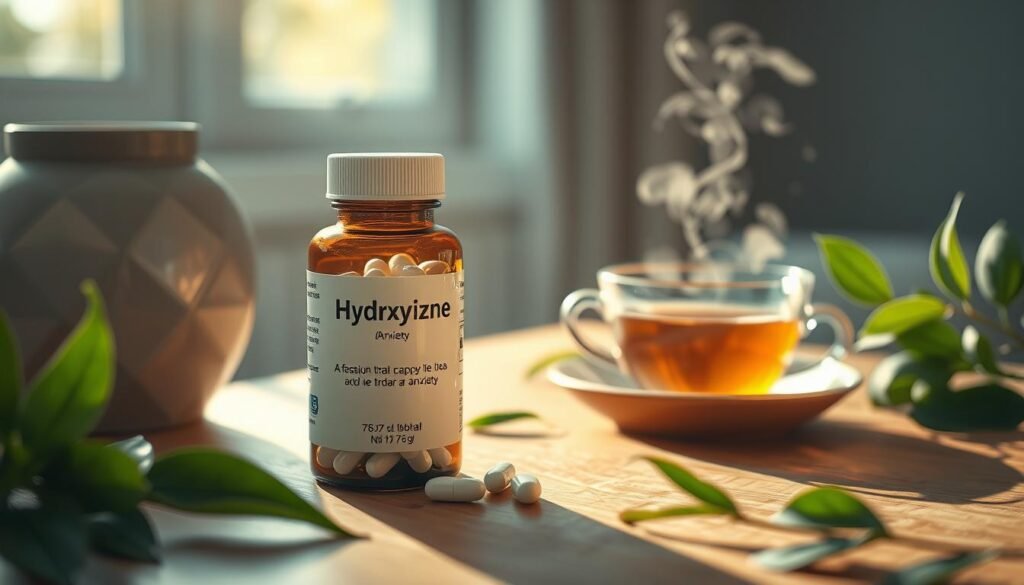Did you know over 30% of U.S. adults face anxiety disorders in their lifetime? This fact highlights the need for effective treatment options. Hydroxyzine is one such option for managing anxiety symptoms, though it’s not the first choice like SSRIs or SNRIs. This article explores hydroxyzine’s benefits and facts, focusing on its use for short-term anxiety treatment.
Hydroxyzine is FDA-approved for treating anxiety, itchiness from allergies, and helping with sleep before surgery. While it might not be everyone’s first choice, it can offer significant relief for people with generalized anxiety disorder (GAD). Knowing hydroxyzine’s potential can help people make better choices for their mental health care.
Adults typically take 50-100 mg of hydroxyzine, up to four times a day. It comes in tablets, capsules, and syrup, suited for various ages. For guidelines on safe and effective use, visit hydroxyzine dosing guidelines.
Key Takeaways
- Hydroxyzine effectively manages anxiety symptoms and offers short-term relief.
- More than 30% of U.S. adults experience anxiety disorders, making effective treatments essential.
- The FDA approves hydroxyzine for treating anxiety and sleep issues related to anxiety.
- Adult dosage typically ranges from 50-100 mg, taken up to four times daily.
- Hydroxyzine is not habit-forming and is safe under medical advice.
- Common side effects include drowsiness, dry mouth, and dizziness.
- Pregnant individuals and those with certain medical conditions may need to avoid hydroxyzine.
Understanding Hydroxyzine and Its Uses
Hydroxyzine is a well-known antihistamine used to ease anxiety. The FDA approves it for dealing with allergy symptoms and helping with anxiety short-term. It attacks both histamine and serotonin in the brain. This makes it great for those dealing with intense stress. It’s good for anxiety but should be seen as a stopgap until other treatments work.
For managing anxiety, adults usually take 50 to 100 milligrams four times daily. This dosage provides quick relief. Kids six and older can take 50 to 100 milligrams throughout the day. Older patients can use it too, but with more caution because of side effects.
Side effects might include dry mouth, feeling sleepy, and getting dizzy. Although not common, some may face severe issues like allergic reactions and chest pain. Those with certain medical conditions must talk to their doctor before taking hydroxyzine. Checking for drug interactions is also key to staying safe.
Overall, hydroxyzine is effective for dealing with anxiety and stress. It’s an important part of treating these issues. Doctors keep a close eye on users, especially those at greater risk. Knowing how it works and its safety measures is crucial for getting the best results.
What is Hydroxyzine?
Hydroxyzine is a well-known prescription antihistamine used for various conditions, including anxiety. It works by blocking histamine, similar to Benadryl. You can find it as hydroxyzine hydrochloride (Atarax) and hydroxyzine pamoate (Vistaril).
It serves several important roles. Mainly, it helps ease anxiety, prepares patients for surgery with sedation, and reduces itching from allergies. With these uses, hydroxyzine meets a wide range of needs for those with anxiety disorders.
Research backs hydroxyzine’s effectiveness in treating anxiety. Out of 39 studies, five showed it worked better than a placebo for anxiety disorder. The data showed hydroxyzine was as good as other anxiety meds in terms of safety and acceptance.
Hydroxyzine comes in different forms, with doses like 10 mg, 25 mg, and 50 mg. The tablets, in various colors and shapes, have unique markings for easy identification. There’s also a liquid form, making it adaptable for treating anxiety.
For detailed info on the medication and doses, check this source. Hydroxyzine is a key option for managing anxiety and other related symptoms, offering diverse solutions for coping with anxiety.
How Does Hydroxyzine Work for Anxiety?
Hydroxyzine, commonly prescribed for anxiety, works well because of its special actions. It stops histamine reactions and blocks serotonin. This 2-way action helps ease anxiety quickly, often in 15-30 minutes. Some people might feel its full effects in 1-2 hours.
This fast action makes hydroxyzine stand out compared to other medicines like SSRIs. SSRIs can take weeks to start working. How well hydroxyzine works depends on the dose, your body, and how you take it. Taking more can work faster but might cause more side effects. For sudden panic attacks, hydroxyzine offers fast relief.
If hydroxyzine doesn’t work well for you, talk to a doctor. There are other options or treatments like cognitive behavioral therapy (CBT). Changing the dose might help with side effects like feeling sleepy or a dry mouth.
| Factor | Influence on Hydroxyzine |
|---|---|
| Dosage | Higher doses provide quicker relief but increased side effects. |
| Metabolic Rate | Individual metabolism affects how quickly hydroxyzine takes effect. |
| Administration Form | Injection may lead to faster results than oral tablets. |
Knowing how hydroxyzine helps with anxiety can help you choose the best treatment. Always talk with professionals about any questions or for other treatments. To learn more about hydroxyzine, visit this resource.
Is Hydroxyzine Good for Anxiety – Benefits & Facts
Hydroxyzine is a top choice for easing anxiety, especially for those with generalized anxiety disorder (GAD). It’s a sedating antihistamine that offers quick relief for anxiety. Studies show that it works better than a placebo in many cases.
Effectiveness in Generalized Anxiety Disorder (GAD)
Hydroxyzine can significantly ease GAD symptoms. It reduces anxiety, helping people feel in control again. Its fast action, starting in 15 to 30 minutes, is perfect for sudden anxiety spikes. Users often feel better soon after taking it, showing is hydroxyzine good for anxiety is an important question for those looking for relief.
Potential for Short-term Anxiety Relief
Hydroxyzine stands out for short-term anxiety relief. It’s not addictive like some anxiety meds. This makes it safer to use than drugs like lorazepam. Patients can choose from different strengths to meet their needs. For more on hydroxyzine’s benefits, click here.

| Formulation | Strengths Available |
|---|---|
| Hydroxyzine Pamoate Capsules | 25 mg, 50 mg, 100 mg |
| Hydroxyzine HCl Tablets | 10 mg, 25 mg, 50 mg |
| Hydroxyzine HCl Syrup | 10 mg/5mL |
| Hydroxyzine HCl Solution | 25 mg/mL, 50 mg/mL |
| Brand Name (Vistaril®) | 25 mg, 50 mg |
In summary, hydroxyzine is a non-addictive way to manage anxiety. Deciding if is hydroxyzine good for anxiety depends on personal experience and needs.
Dosage and Administration of Hydroxyzine
It’s important to know how to use hydroxyzine correctly for anxiety relief. This medication comes in oral tablets. You can find them in strengths like 10 mg, 25 mg, and 50 mg. For adults dealing with anxiety, the usual dose of hydroxyzine is between 50 and 100 mg. This can be taken up to four times a day.
Common Dosages for Anxiety Treatment
The following table shows common hydroxyzine dosages for anxiety and other issues:
| Patient Age Group | Indication | Typical Dosage | Daily Maximum Dose |
|---|---|---|---|
| Adults | Anxiety | 50-100 mg, 4 times a day | 400 mg |
| Children (6 years and older) | Anxiety | 50-100 mg, divided doses | Not specified |
| Children (under 6 years) | Anxiety | 50 mg, divided doses | Not specified |
| Adults | Sedation | 50-100 mg, once before procedure | Not specified |
| Children (Sedation) | Based on weight* | 0.6 mg/kg, once before procedure | Not specified |
Note: Dosages for itching and other conditions may differ from those listed for anxiety.
How to Take Hydroxyzine Safely
Taking hydroxyzine safely is key. Always follow your doctor’s advice about your dosage. Remember a few important things:
- Keep hydroxyzine in a closed container at room temperature, away from heat and moisture.
- If you miss a dose, take it as soon as you can. If it’s almost time for your next dose, skip the missed one.
- Stay away from alcohol and drugs that slow down the brain while on this medication.
- Seeing your doctor regularly is a good idea to check on the medicine’s effects and your heart rhythm.
Hydroxyzine vs. Other Anxiety Medications
When looking into treatments for anxiety, it’s crucial to see how hydroxyzine stands out. Unlike many medications, hydroxyzine is mainly for short-term use, up to four months. This difference makes it unique from antidepressants, which are for long-term care.
Comparison with Antidepressants
Antidepressants like SSRIs and SNRIs are often chosen first for anxiety. But hydroxyzine is different, offering quick help instead of long-term control. It can be taken in doses from 25mg to 100mg, up to four times daily. This means treatment with hydroxyzine can be customized to fit personal needs.
| Medication | Type | Typical Dosage | Dependency Risk |
|---|---|---|---|
| Hydroxyzine | Antihistamine | 25mg to 100mg up to 4 times/day | Non-habit forming |
| Xanax (Alprazolam) | Benzodiazepine | 0.25mg to 0.5mg up to 3 times/day | Higher risk |
Non-Habit Forming Characteristics
Hydroxyzine is favored because it’s not addictive. It’s a safer choice compared to benzodiazepines like Xanax, which have a higher addiction risk. Hydroxyzine is effective for anxiety without the risk of misuse. Still, it can make you sleepy, an effect that lasts about four to six hours.

Hydroxyzine Side Effects to Consider
Understanding the side effects of hydroxyzine anxiety medication is key. They usually include drowsiness, dizziness, dry mouth, and blurred vision. These effects tend to go away as your body gets used to the medicine. Pay attention to how you feel when you start taking it.
Common Side Effects
Hydroxyzine side effects can include:
- Drowsiness
- Dizziness
- Dry mouth
- Blurred vision
- Headaches
These issues are often mild and usually get better over time. Still, be careful, especially if you need to be fully alert like when driving.
Serious Side Effects That Require Attention
Some rare but serious side effects are:
- Seizures
- Severe rash
- Fever
- Tremors
- Blister-like sores
If you have these symptoms, get help right away. This means talking to your doctor quickly. Staying safe while using hydroxyzine anxiety medication is very important.
To know more about anxiety treatment and its side effects, check out resources. This article offers good information.
Precautions and Contraindications
When thinking about hydroxyzine for anxiety, knowing the needed precautions is key. This med is effective but not for everyone. Discuss openly with your doctor to use hydroxyzine safely.
Medical Conditions That May Be Affected
Many health issues can affect hydroxyzine’s safety. Avoid this drug if you have:
- Allergies to hydroxyzine or its parts
- Heart problems, like long QT syndrome
- Electrolyte imbalances or heart rhythm troubles
- Pregnancy concerns, particularly in the early stages due to scarce human data
- Conditions that might make side effects worse, such as being older or having other health problems
Interactions with Other Medications
Hydroxyzine can interact with many drugs, making this a big deal for those treating anxiety. Important interactions to note include:
- Moderate interactions with over 200 drugs
- Severe interactions with drugs like amiodarone and fluoxetine
- Drugs known to extend the QT interval, including some antibiotics and antidepressants
It’s crucial to consider these interactions for safety and treatment success. Talk to your healthcare provider about all meds before starting hydroxyzine. Elderly people and those with heart issues need extra care and dosage adjustments.
Hydroxyzine for Panic Attacks
Many people in the U.S. suffer from panic disorder every year. Hydroxyzine is becoming a popular choice for quick relief during these tough times. Though it’s mostly used for allergies, its effects also help those dealing with panic attacks.
Can Hydroxyzine Stop Panic Attacks?
Hydroxyzine is quick in easing symptoms of anxiety. Some patients have found it especially helpful for sudden panic episodes. For example, one report showed quick relief for a patient using hydroxyzine 25 mg three times a day.
This quick action makes it stand out from other drugs like benzodiazepines, which have higher risks and can lead to addiction.
How Effective Is It for Acute Situation Relief?
Hydroxyzine is not just fast; it also helps improve mental clarity better than some drugs. A study found it better than lorazepam in treating general anxiety without harming organs or causing addiction. This makes it a safer choice for doctors wary of overusing benzodiazepines.
In urgent cases of anxiety, hydroxyzine proves to be a reliable option. It quickly manages symptoms of acute panic disorder, avoiding the pitfalls of addictive medications.
| Medication | Effectiveness | Dependency Risk | Cognitive Performance |
|---|---|---|---|
| Hydroxyzine | Effective for panic attacks | Low | Greater improvement |
| Lorazepam | Effective for anxiety | High | Moderate improvement |
| Benzodiazepines | Effective for panic attacks | Very high | Variable performance |
Long-term vs. Short-term Use of Hydroxyzine
Knowing how to use hydroxyzine right is key for folks with anxiety. It’s great for quick help, but using it for a long time needs care. Doctors usually say to take it for only up to four months to avoid getting used to it.
When Is Hydroxyzine Appropriate for Long-term Use?
Sometimes, hydroxyzine is okay for longer if it bridges the gap to other treatments. It can be a support for ongoing anxiety issues, working with other meds. This helps manage symptoms well without leading to a dependency.
Management of Short-term Anxiety Episodes
Hydroxyzine shines when dealing with sudden anxiety. Approved by the FDA, it starts working fast, between 15 to 60 minutes. It’s great for surprise stress or in therapy. Dosage can be tailored, usually between 50 mg to 100 mg, depending on what’s needed.

Hydroxyzine’s Role in Treating Anxiety Disorders
Hydroxyzine is a key medication for managing anxiety. It works quickly, helping many people. Knowing how it can be used is crucial for both doctors and patients.
Specific Anxiety Disorders Hydroxyzine Can Help
Hydroxyzine mainly helps with generalized anxiety disorder (GAD) and panic disorders. It can reduce GAD symptoms in just one week. Its non-addictive quality sets it apart from other treatments.
Adults can take up to 100 mg four times daily during intense anxiety. This flexibility helps personalize treatment to individual needs.
Patient Experiences and Testimonials
Many have shared their positive experiences with hydroxyzine. They usually feel relief in 1-2 hours, which is faster than other medications. These stories show how hydroxyzine enhances daily life by reducing anxiety.
While some mention drowsiness as a side effect, it can aid those with sleep issues caused by anxiety. With advice from doctors, hydroxyzine proves useful for many in managing their anxiety.
| Aspect | Details |
|---|---|
| Primary Uses | Generalized Anxiety Disorder (GAD), Panic Disorders |
| Dosage Range | 50-100 mg, up to four times a day |
| Onset of Effects | 1-2 hours |
| Common Side Effect | Drowsiness |
| Patient Feedback | Fast-acting, non-habit-forming, improved quality of life |
Conclusion
Hydroxyzine is often talked about for anxiety relief. Many want to know, is hydroxyzine good for anxiety? It works quickly to calm anxiety without the risk of addiction. By acting on the brain’s histamine receptors, it brings about a calming effect.
Although not the primary choice, hydroxyzine is valuable when other treatments don’t work. People’s experiences show it can greatly improve life quality. Yet, its effectiveness varies by person. That’s why it’s important to talk to a doctor about using hydroxyzine for anxiety.
It’s key to understand that hydroxyzine doesn’t cure anxiety but eases its symptoms. When combined with therapy, like CBT, its benefits can be enhanced. This can lead to a happier life.